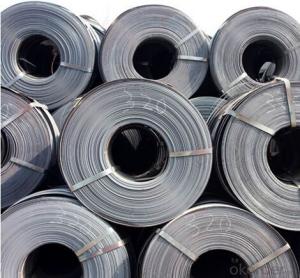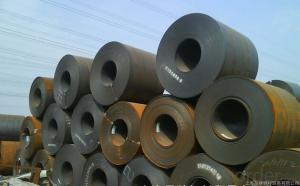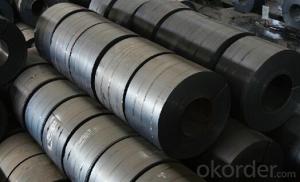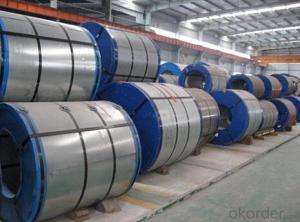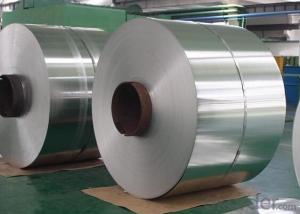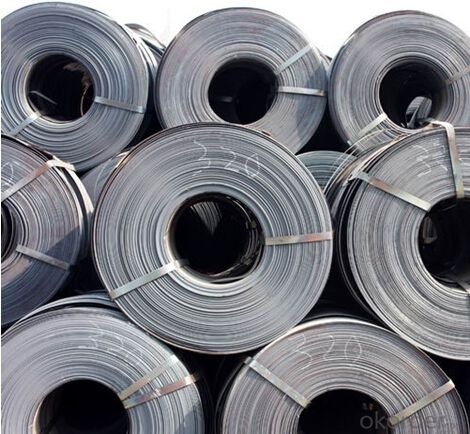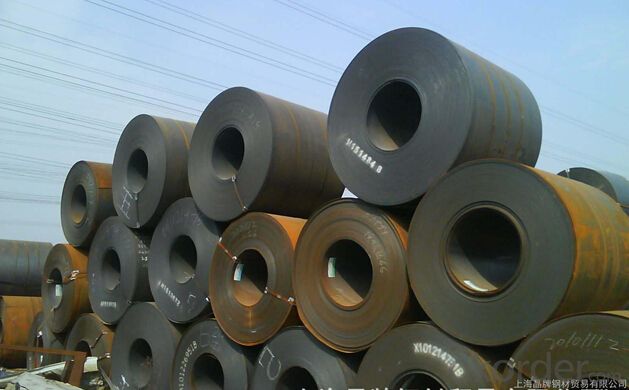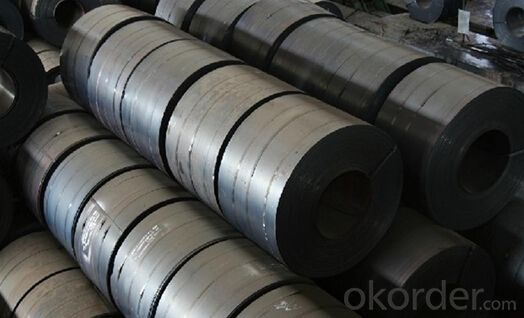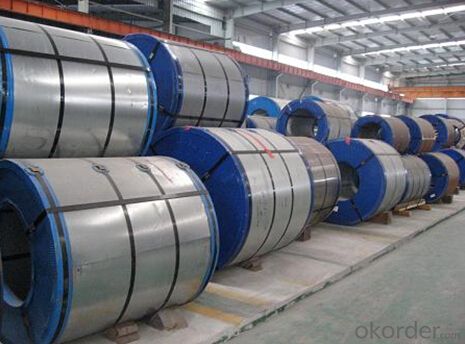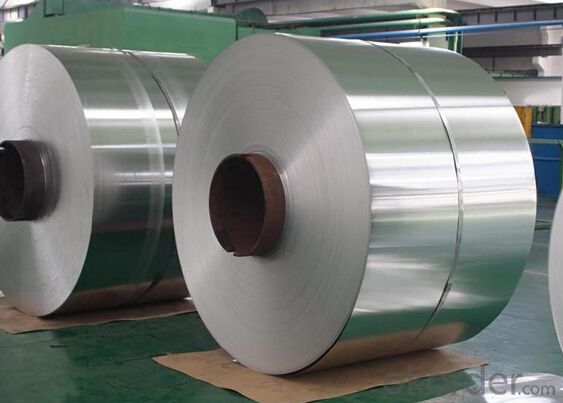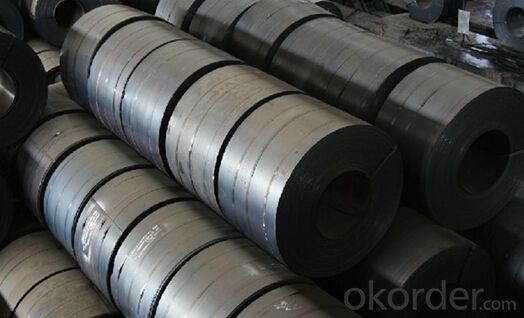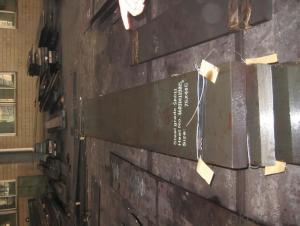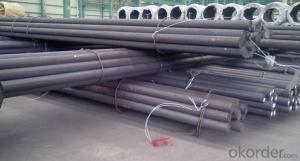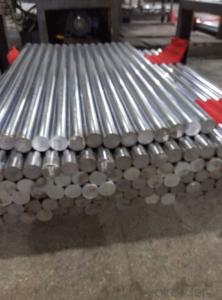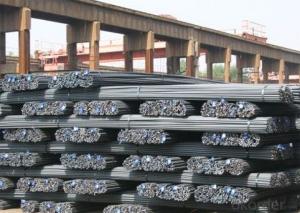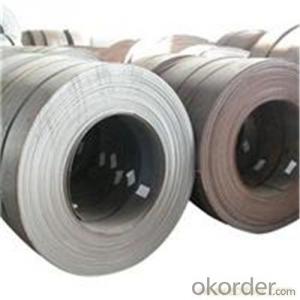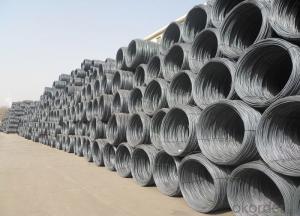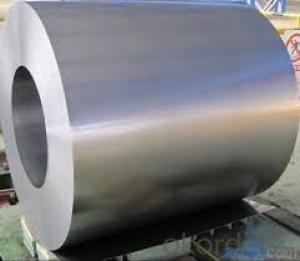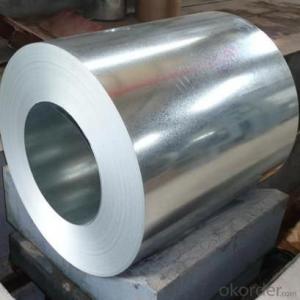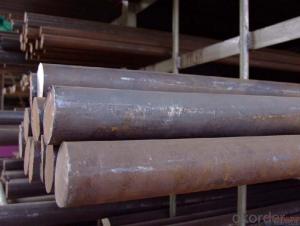S50C HR High Carbon Steel Coil_ Plate_Strip with Low Price
- Loading Port:
- Tianjin
- Payment Terms:
- TT OR LC
- Min Order Qty:
- 25 m.t.
- Supply Capability:
- 10000 m.t./month
OKorder Service Pledge
OKorder Financial Service
You Might Also Like
Specification
S50C HR High Carbon Steel Coil_ Plate_Strip with Low Price
Quick Details
Name | Hot Rolled Steel Coil |
Standard | GB/ASTM/SAE/AISI/DIN/JIS/EN/BS |
Surface Treatment: | Black/Peeling/Polished/Machined |
Delivery Condition: | Hot Rolled or Forged/Peeled or Black Surface |
Test | SGS/UT 100% Elements Testing |
Certificate: | ISO/Mill Certificate |
Service: | 24 hours online service / |
more than 20 years trading and manufacture | |
Quality Assurance: | the third party inspection, such as SGS, BV, TUV…etc. is acceptable |
Packaging Details: | Seaworthy Packaging or as per customer's packing instruction |
Specification
Commodity | Hot rolled steel plate/Mild steel plate/black steel plate/Carbon steel plate/sheet |
STEEL GRADE | A36, AH36,A283 Gr.C, SS400, S235J1/S235J2/S235JR, S275J1/S275J2/S275JR, A516 Gr.60/A516 Gr.70, ST37-2 |
Standard | GB,JIS,DIN,AISI,ASTM |
Thickness | 1.5mm ~ 200mm |
Width | 1000mm 1220mm 1250mm 1500mm 2000mm 2500mm 3000mm |
length | below 12000mm & coil |
Surface | Clean, blasting and painting according to customer requirement |
Delivery time | standard size 15days goods can load into container, if produce goods need 35days |
Application | Widely used in petrochemistry,chemistry,electricity,boiler and vessel manufacture,and could |
be made into reactor,heat exchange facility,segregator,sphere vessel,oil tank,liquid gas storage | |
tank,nuclear reactor press shell,turbine and other machines | |
Shipping | length below 5.8m with 20' container, length below 11.8m with 40' container. or Bulk shipping. |
Company Information
CNBM International Corporation is the most import and export platform of CNBM group(China National Building Material Group Corporation) ,which is a state-owned enterprise, ranked in 270th of Fortune Global 500 in 2015.
With its advantages, CNBM International are mainly concentrate on Cement, Glass, Iron and Steel, Ceramics industries and devotes herself for supplying high quality series of refractories as well as technical consultancies and logistics solution.
After-sale service | l CNBM provides the services and support you need for every step of our cooperation. We’re the business partners you can trust; you can relax and get on with doing business. |
l For any problem, please kindly contact us at any your convenient time, we’ll reply you in our first priority within 24 hours | |
Advantages | Industry experience over 20 years. |
Shipment of goods -More than 70 countries worldwide. | |
The most convenient transport and prompt delivery. | |
Competitive price with best service. | |
High technical production line with top quality products. | |
High reputation based on best quality products. |
Product Show
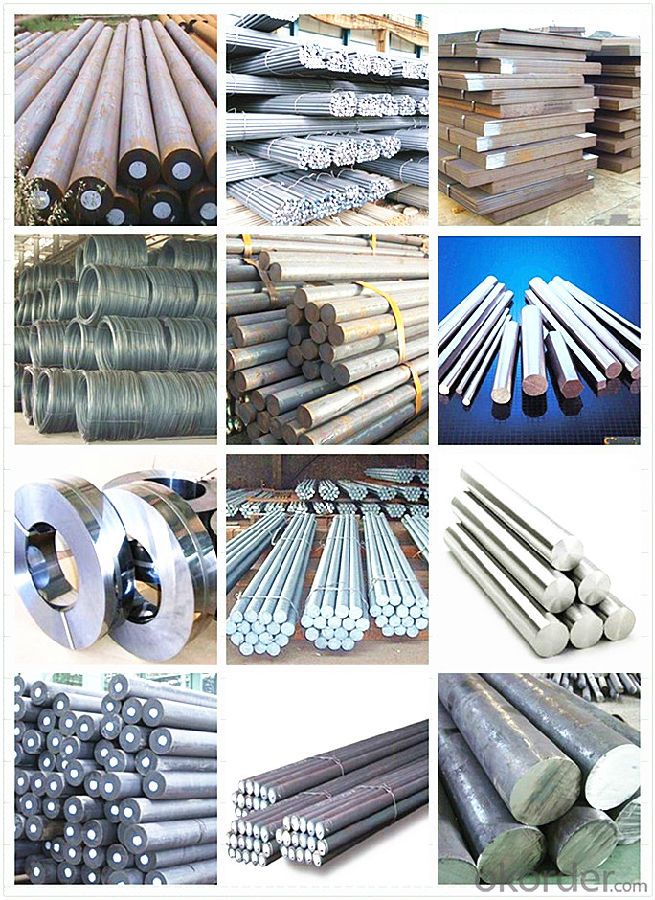
FAQ
Are you a trading company or manufacturer? | Manufacturer |
What’s the MOQ? | 3 metric ton |
What’s your delivery time? | 15-35 days after downpayment received |
Do you Accept OEM service? | Yes |
what’s your delivery terms? | FOB/CFR/CIF |
What's the Payment Terms? | 30% as deposit,70% before shipment by T/T |
Western Union acceptable for small amount. | |
L/C acceptable for large amount. | |
Scrow ,Paybal,Alipay are also ok | |
Why choose us? | Chose happens because of quality, then price, We can give you both. |
Additionally, we can also offer professional products inquiry, products knowledge train (for agents), smooth goods delivery, excellent customer solution proposals. | |
What's your available port of Shipment? | Main Port, China |
What’s your featured services? | Our service formula: good quality+ good price+ good service=customer's trust |
Where are your Market? | Covering more than 160 countries in the world |
- Q: What are the main factors affecting the tensile strength of special steel?
- Several factors affect the tensile strength of special steel. Firstly, the chemical composition of the steel plays a vital role in determining its tensile strength. Elements like carbon, manganese, silicon, chromium, nickel, and molybdenum can greatly enhance the steel's ability to resist deformation under tensile loads by forming solid solutions, carbides, and intermetallic compounds. Secondly, the heat treatment processes applied to special steel have a significant impact on its tensile strength. Quenching and tempering, annealing, and precipitation hardening can alter the microstructure of the steel, resulting in specific phases and grain structures that enhance its tensile strength. Moreover, the mechanical working or deformation processes that the steel undergoes can also affect its tensile strength. Techniques such as rolling, forging, or extrusion can refine the grain structure and induce dislocations within the material, leading to an increase in tensile strength. The presence of impurities and defects within the steel can negatively impact its tensile strength. Inclusions, voids, or cracks act as stress concentration points, reducing the overall strength of the material. Therefore, it is crucial to implement proper quality control measures during the manufacturing process to minimize these defects and ensure high tensile strength. Furthermore, the temperature at which the steel is exposed can influence its tensile strength. Special steel typically experiences a decrease in tensile strength as the temperature increases due to thermal expansion and the loss of material strength. Therefore, it is important to consider the temperature range in which the steel will be used and select an appropriate grade with the desired tensile strength. In conclusion, the tensile strength of special steel is affected by various factors, including chemical composition, heat treatment, mechanical working, impurities, defects, and temperature. By considering and optimizing these factors during the manufacturing process, special steel with exceptional tensile strength properties can be achieved.
- Q: What are the main factors affecting the wear resistance of special steel?
- The main factors affecting the wear resistance of special steel include the composition of the steel, the hardness and microstructure of the steel, the presence of carbides or other hardening elements, the surface finish and treatment of the steel, and the operating conditions in which the steel is used.
- Q: How does aluminum contribute to the properties of special steel?
- Aluminum contributes to the properties of special steel by improving its strength, corrosion resistance, and heat resistance. It forms a thin layer of aluminum oxide on the surface, which acts as a protective barrier against rust and other environmental factors. Additionally, aluminum helps in refining the grain structure of the steel, making it stronger and more durable. It also enhances the steel's ability to withstand high temperatures, making it suitable for various applications in industries like aerospace, automotive, and construction.
- Q: What are the different forging techniques for special steel?
- There are several different forging techniques used for special steel, including open die forging, closed die forging, and ring rolling. Open die forging involves shaping the steel between flat dies or anvils, while closed die forging uses shaped dies to compress the steel into the desired shape. Ring rolling involves shaping the steel by rolling it between two or more dies, creating a seamless ring shape. Each forging technique has its own advantages and is chosen based on the specific requirements of the steel product being produced.
- Q: What are the different heat treatment methods for special steel?
- There are several heat treatment methods for special steel, including annealing, quenching, tempering, and normalizing. Annealing involves heating the steel to a specific temperature and then slowly cooling it to improve its machinability and reduce internal stresses. Quenching is a rapid cooling process that makes the steel harder and more brittle, but also increases its strength. Tempering is a heat treatment process that involves reheating quenched steel to a specific temperature and then cooling it again to improve its toughness and reduce brittleness. Normalizing is another heat treatment method that involves heating the steel to a specific temperature and then cooling it in still air to improve its mechanical properties and refine its grain structure.
- Q: What are the cost considerations when using special steel?
- When utilizing special steel, there are several factors to consider in terms of cost. To begin with, the cost of the raw materials required for the production of special steel can be significantly higher compared to regular steel. Special steel often incorporates alloying elements like chromium, nickel, or molybdenum, which tend to be more costly than the iron and carbon used in regular steel production. These alloying elements enhance the properties of the steel, resulting in increased strength, greater resistance to corrosion, or improved suitability for specific applications. Furthermore, the production process for special steel may entail additional steps or specialized equipment, leading to higher manufacturing costs. This can involve procedures like vacuum degassing, controlled cooling, or precision forging, all of which contribute to the quality and performance of the final product but also add to the overall expenses. Moreover, since special steel is often customized to meet specific requirements or industry standards, there may be additional costs associated with testing and certification. These can include non-destructive testing, material analysis, or third-party inspections to ensure compliance with the necessary specifications. These additional quality control measures can raise the overall cost of utilizing special steel. Lastly, the cost of special steel can also be influenced by its demand and availability. If there is high demand for certain types of special steel or if the supply is limited, prices may be driven up. This can be particularly pertinent to industries that rely on specialized steel grades such as aerospace, automotive, or oil and gas. In conclusion, the cost considerations when using special steel encompass the higher cost of raw materials, the additional manufacturing steps, the requirements for testing and certification, and the overall dynamics of supply and demand in the market. However, it is important to note that the benefits and advantages of employing special steel, such as improved performance, durability, or specific properties, often outweigh the higher costs, making it a worthwhile investment for many industries.
- Q: What are the main applications of special steel in the medical field?
- Special steel is widely used in the medical field for various applications. Some of the main applications include surgical instruments, implants, and medical devices. Surgical instruments such as forceps, scalpels, and scissors are often made from special steel due to its high strength, durability, and corrosion resistance. Implants, such as joint replacements and dental implants, are commonly made from special steel alloys that provide strength, biocompatibility, and resistance to wear and tear. Additionally, special steel is used in the production of medical devices like needles, catheters, and stents, where its properties contribute to their effectiveness and safety.
- Q: Can special steel be used in the food processing industry?
- Yes, special steel can be used in the food processing industry. Special steel alloys, such as stainless steel, are commonly used in food processing equipment and machinery due to their corrosion resistance, durability, and hygiene properties. These steel alloys provide a reliable and safe material for handling and processing food, making them an ideal choice for the industry.
- Q: How is low alloy steel used in the manufacturing of pressure vessels?
- Low alloy steel is commonly used in the manufacturing of pressure vessels due to its superior strength, toughness, and resistance to corrosion. It provides the necessary structural integrity and durability required to withstand high pressure and temperature conditions, ensuring the safety and reliability of the vessel. Additionally, low alloy steel allows for cost-effective fabrication while meeting the stringent requirements of pressure vessel codes and standards.
- Q: Can special steel be used in the production of musical instruments?
- Yes, special steel can be used in the production of musical instruments. Special steel, also known as tool steel or high-performance steel, is a type of steel that has been specifically designed to possess certain properties that make it suitable for specific applications. These properties include high strength, durability, and resistance to wear and corrosion. In the case of musical instruments, special steel can be used in various components, such as strings, springs, keys, valves, and reeds. For example, piano strings are typically made from high-carbon steel, which provides the necessary strength and elasticity for producing the desired sound. Brass instruments like trumpets or saxophones have valves made from special steel alloys that have excellent corrosion resistance and can withstand the repetitive movements required for playing the instrument. In addition, special steel can also be used in the manufacturing of instrument parts like guitar frets. Frets are metal strips embedded along the fingerboard of a guitar, and they need to be made from a material that is durable, wear-resistant, and able to hold its shape over time. Special steel alloys, such as stainless steel or nickel-silver, are commonly used for this purpose. Overall, special steel offers a range of properties that can enhance the performance and longevity of musical instruments. By using this type of steel, manufacturers can create instruments that produce high-quality sound, are more resistant to wear and tear, and have a longer lifespan.
Send your message to us
S50C HR High Carbon Steel Coil_ Plate_Strip with Low Price
- Loading Port:
- Tianjin
- Payment Terms:
- TT OR LC
- Min Order Qty:
- 25 m.t.
- Supply Capability:
- 10000 m.t./month
OKorder Service Pledge
OKorder Financial Service
Similar products
Hot products
Hot Searches
Related keywords
